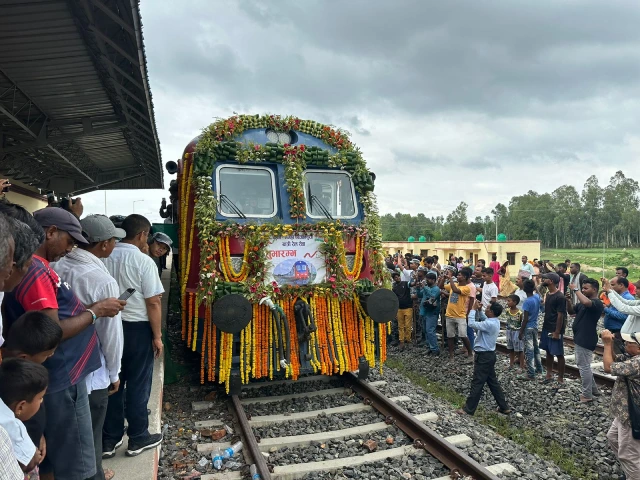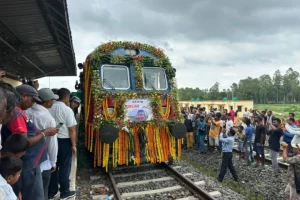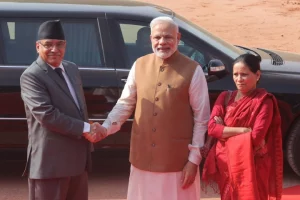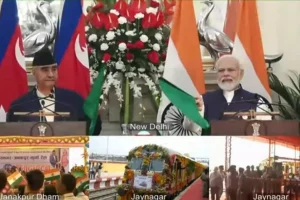Kathmandu: Nepal and India launched another phase of cross-border connectivity with the inauguration of Sunday of the Kurtha-Bijalpura section of the Jayanagar-Bijalpura-Bardibas cross-border rail line.
Railway service has been in operation in the section from the bordering Indian town—Jayanagar, Bihar to Bijalpura area of southern Mahottari district in Nepal since April 2022.
But, one- and-a- half months since the Indian government handed over the Kurtha-Bijalpura section of railway line during Nepali Prime Minister Pushpa Kamal Dahal’s visit to India from May 31 to June 3, the second phase of the railway service was also set in motion on Sunday.
#Bhangaha | Kurtha-Bijalpura rail operation starts today, benefitting Nepalese with affordable and fast transportation mode
PM @narendramodi and Nepalese PM Pushpa Kamal Dahal on June 1, 2023, jointly unveiled the e-plaque of the Kurtha-Bijalpura section of the Railway.
This… pic.twitter.com/6Xdjelf7h0
— All India Radio News (@airnewsalerts) July 16, 2023
Nepal’s Minister of Physical Infrastructure and Transport Prakash Jwala launched the railway service operation in this section in a ceremony held at Bijalpura, Indian embassy in Nepal said in a statement on Sunday. “The Deputy Chief of Mission of Indian embassy Prasanna Shrivastava, political leaders from Madhesh Pradesh of Nepal and representatives of Nepal government were also present at the launch event.”
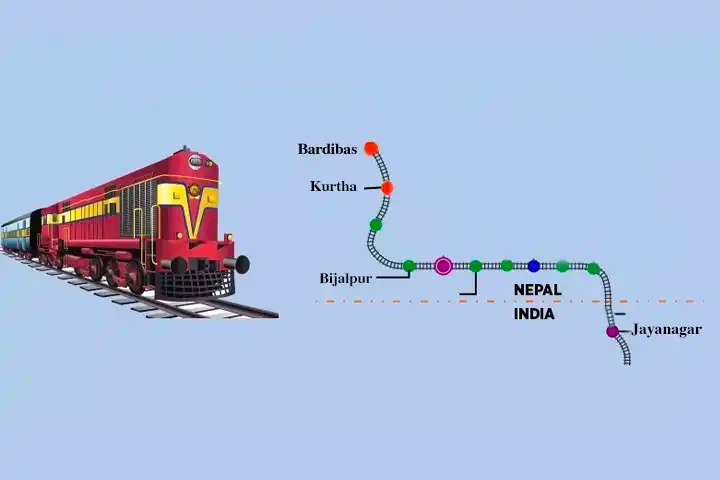
The second phase of the cross-border railways manifests Nepal and India’s aspiration to draw Kathmandu into a broader South Asia railway map.
The inauguration of the second phase is only part of a much bigger Indo-Nepal plan on South Asian connectivity. Already India and Nepal have begun detailed discussions on building a cross-border Kathmandu to Raxaul railway—a move that will connect New Delhi with the Nepalese capital.
The strategic project which would steal a march over China’s plans to extend the Tibet railway to Kathmandu will come at a substantial cost, a senior official with Nepal’s Department of Railway Department told India Narrative.
The Indian side recently submitted the initial report of the Final Location Survey of the proposed railway to the Nepal government which will give the Nepali capital a direct connection with the Indian railway network, enabling uninterrupted train travel to all Indian cities. Once hooked on to the Indian railway system, landlocked Nepal can also be connected to Bangladesh and its ports.
Insiders say the length of the proposed railway will be 141km of which around 41km will be covered by tunnels.
According to the embassy’s statement, the Kurtha-Bijalpura line covers a total of 17.3 km and this stretch is dotted with five stations namely Kurtha, Pipradi, Loharpatti, Singyahi and Bijalpura.
The railway line extending from Jayanagar to Bardibas is being built with Indian government’s grant assistance. Kurtha-Bijalpura is the second phase of the Jayanagar-Bijalpura-Bardibas cross-border rail line project being constructed under the grant assistance of India. The first phase from Jaynagar to Kurtha was inaugurated in April last year and railway service has been in operation since.
“The land acquisition for the third phase connecting Bijalpura to Bardibas is presently ongoing,” the embassy said.
Rohit Kumar Bisural, director general at Nepal’s Department of Railways told the India Narrative that compensation distribution for acquired land has been undergoing to expand the railway line to Bardibas from Bijalpura. “We have already distributed compensation for 80 percent of the acquired land,” he added.
During the inauguration of the Kurtha-Bijalpura section, Minister Jwala said that the rail connectivity would provide a tremendous boost to the people-to-people linkages between the two countries and would enhance trade and tourism in Nepal.
Shrivastava, DCM at the Indian embassy here highlighted the Indian government’s continued commitment to work towards further strengthening of the development partnership for the benefit of the peoples of both countries.
According to the embassy, implementation of this project will bring reliable, affordable, and fast transportation to new areas in Nepal.
This project is one element of the series of connectivity projects which are presently being implemented by India in Nepal. “These (projects) will further lead to enhancing physical connectivity between India and Nepal, which forms an important element of the Government of India’s Neighbourhood First policy,” the embassy said.”
Also Read: India and Nepal take first steps to connect New Delhi with Kathmandu stealing march over China






